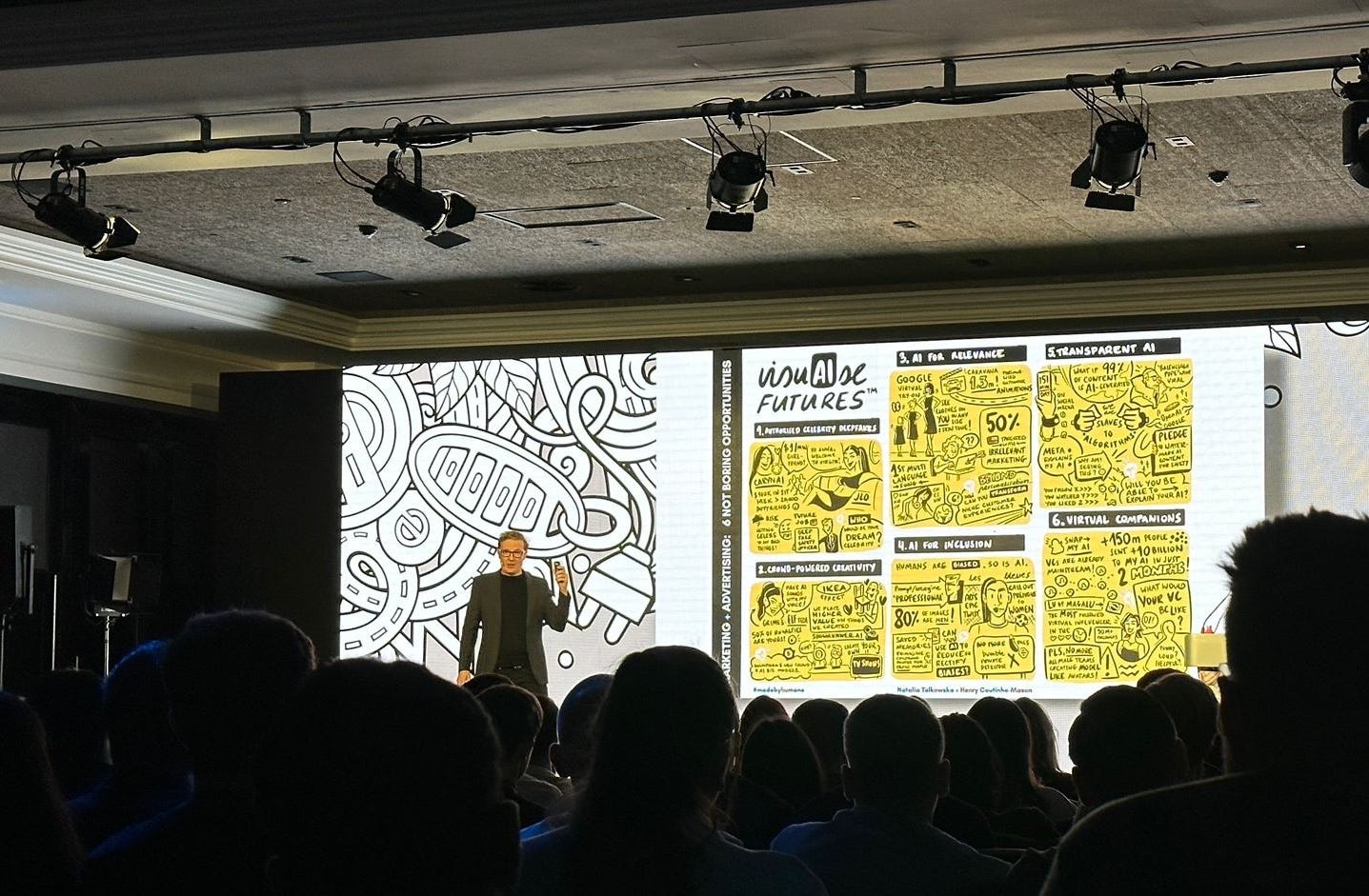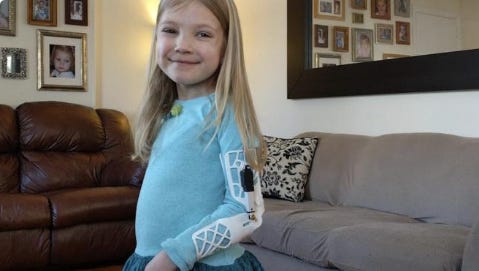Crowd-powered public health; accelerated learning; conflicting views of techno-optimism and more...
⏩ Future Normal Fast Forward #90
For anyone trying to keep up with the pace of innovation, 2023 was the year that most of us truly started to experience what 'exponential growth' feels like.
Relentless. Uncertain. Exhilarating. Overwhelming. All of the above?
The purpose of this newsletter is to remind you that, beneath the frothy social media surface level noise and glossy demo videos, the strongest currents are more predictable and even slow-moving. I was writing about this week’s underlying topics – tech for good, crowdsourcing and community, personalised learning and the desire to develop digital skills – in 2013. And I bet I will still be writing about them in 2033. People’s fundamental human needs and desires remain stable, even as the technologies change – today it’s generative AI, in 2013 it was Web 2.0. I have no idea what it will be in 2033 (assuming we aren’t mere pawns for superintelligent AI by then 😬).
What will change profoundly is people’s expectations.
The Big Idea at the heart of this newsletter is that people’s expectations are set by their experiences. And the best way to anticipate emerging expectations is to look at how other innovators are raising the bar. What is new and better (i.e. cheaper, faster, cleaner, healthier, etc) today, will be ‘normal’ tomorrow.
So, as you read this week’s stories, ask yourself: “are we ready if this becomes normal?” Or even, “where and how could we be the ones to make this normal in our market or industry?”
Let’s go…
Fruitpunch AI Challenges: Crowd-powered public health
One of my favourite sessions at Board of Innovation’s recent Autonomous Innovation Summit was by Sako Arts, founder of FruitPunch AI. The Dutch startup runs ‘AI for Good’ challenges in association with relevant non-profits focused on wildlife, climate and health topics. During the 10-week challenges, participants receive expert mentoring and receive certifications. For example, earlier this year it ran an “AI against Toxic Clouds” challenge, in association with Greenpeace. Teams used computer vision to continuously monitor camera footage of a large steel plant in the Netherlands for the emission of illegal toxic clouds.
// So What?
There’s so much going on here it’s like trend bingo. Some quick thoughts:
Amid all the AI doomerism, we desperately need more examples of how AI can solve real-world problems. We will only create the future we can imagine.
Struggling to recruit AI talent? Why not run a challenge that gives people the chance to develop increasingly-valuable AI skills? You might also find your next AI genius at the same time…
AI empowers people to tackle the things that are important to them. Industries such as government, healthcare and education that have previously seen a big gap between people’s (strong) engagement and their (weak) capabilities need to prepare for a big disruption. The AI era will see a host of citizen-, patient-, and learner-created bottom-up solutions. How will you encourage, support and scale these?
Side note: I’m also delighted to share that I’m busy working with Natalia Talkowska on the next iteration of VisuAIse Futures: Healthcare, highlighting 5 people-first AI strategies that will transform the patient and clinician experience. Sign up to get the full report when it launches in January.
Or if you’re working in healthcare and would like a sneak preview of what we’re working on, then DM me – we love feedback 😇
Nolej: Founder builds his daughter a brain controlled exoskeleton to show power of AI-accelerated learning
Bodo Hoenen's daughter had a muscular degenerative condition that left her paralysed in her left arm. 10 years ago, he'd have been out of luck. Instead, now he was able to use AI to create an accelerated learning roadmap that helped him identify how to to build a brain-controlled exoskeleton for his daughter. He is now applying this experience to his startup Nolej, which uses generative AI to create custom learning pathways to help people reach a specific goal faster. The startup just raised €3 million to expand and scale its offering.
// So what?
I'm excited for AI because I'm optimistic about people, and this story shows why. Cynics will say that Bodo Hoenen, Nolej’s founder, is hardly Mr. Average Learner, having sold his previous startup to Google. That's true, but look past this initial extreme case and remember that the AI you are using today is the worst AI you'll ever use; similarly AI won't only get more powerful, it will also get easier to use (we won't all need to learn how to survive Discord's UX!).
But the biggest takeaway repeats the point I made above – AI radically extends and amplifies people's capabilities; innovation will come from everywhere, all at once. Given this, the big question you should be preparing for is “what will you build when it becomes 100x easier to build anything?”
Side note 2: Nolej’s first product is automating study materials. I used it to create some flashcards based on a recent keynote. I literally dropped in the YouTube link, and then spent <5 minutes lightly editing a few small errors and duplications. It’s very impressive – check them out here!
Want more? A few extra links worth your time.
AI agent trains robots to accomplish complex tasks. Yes, you read that right – an AI trained the robots in this video to do these tasks. Independently. And it did it better than expert humans in more than 80% of tasks. 🤯 What happens when we bring generative AI to the physical world?
Regretful Accelerationism. Ben Thompson’s thoughtful piece explores whether the end of the human-created internet will liberate us. “Some may lose themselves to the algorithm and AI friends, but perhaps more will realize that the only way to survive online is to pay it increasingly little heed.”
My Techno-Optimism. I’m not a big fan of cypto (well, more correctly I’m not a fan of the gap between what crypto promises and its scam-ridden reality), but Vitalik Buterin’s manifesto is excellent. “We need active human intention to choose the directions that we want, as the formula of "maximize profit" will not arrive at them automatically.” Amen 🙏
2024 Trend Decks. My most popular post of the year was echoing Matt Klein’s claim that “trends have lost all meaning”. This Google Drive containing 92 (!!) trend reports shows why – there’s simply too many, with too few deep insights. My friend Michell Zappa created a custom GPT to interrogate them all. But in truth, trends are only as good as the actions they inspire.
Watch: Three Non-Obvious Ideas To Design A People-First AI Strategy
Over half my gigs during the Q4 event season were focused on AI. Flipping the script and exploring the human-focused opportunities that AI will unlock seems to be landing surprisingly well.
Here’s a talk I gave to 300+ Chief Learning Officers recently:
Here’s what Cassie Gasson, Thrive’s CMO had to say about it:
“Henry was recommended to us and he didn't disappoint! Despite the short notice due to a last-minute keynote dropout, Henry spent time on the phone with me the day before to perfectly understand our audience and tailor his talk to what L&D cares about. I'd definitely recommend Henry to anyone looking to deliver a session on a fresh take on AI and the future normal, we've had lots of follow up questions asking for slides post session too!”
Some other recent feedback:
“My go-to speaker for future-gazing grounded in reality is always Henry. He's a fantastic speaker who fills big rooms and gets high praise on feedback forms. It's refreshing to work with someone who puts so much time and effort into making a killer keynote that resonates with our audience and helps attendees to make sense of where the world is going – free from the BS and hype that's often prevalent in this space!”
Dan Brain, Founder, MAD//Fest
"The team left with a clear way to identify and seize the opportunities AI will present in the months ahead"
James Jackson, CEO, Bumper
Sound good? To discuss your next meeting or event then please reach out directly to Renee Strom or check out my speaking site.
Thanks for reading,




